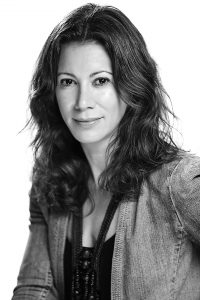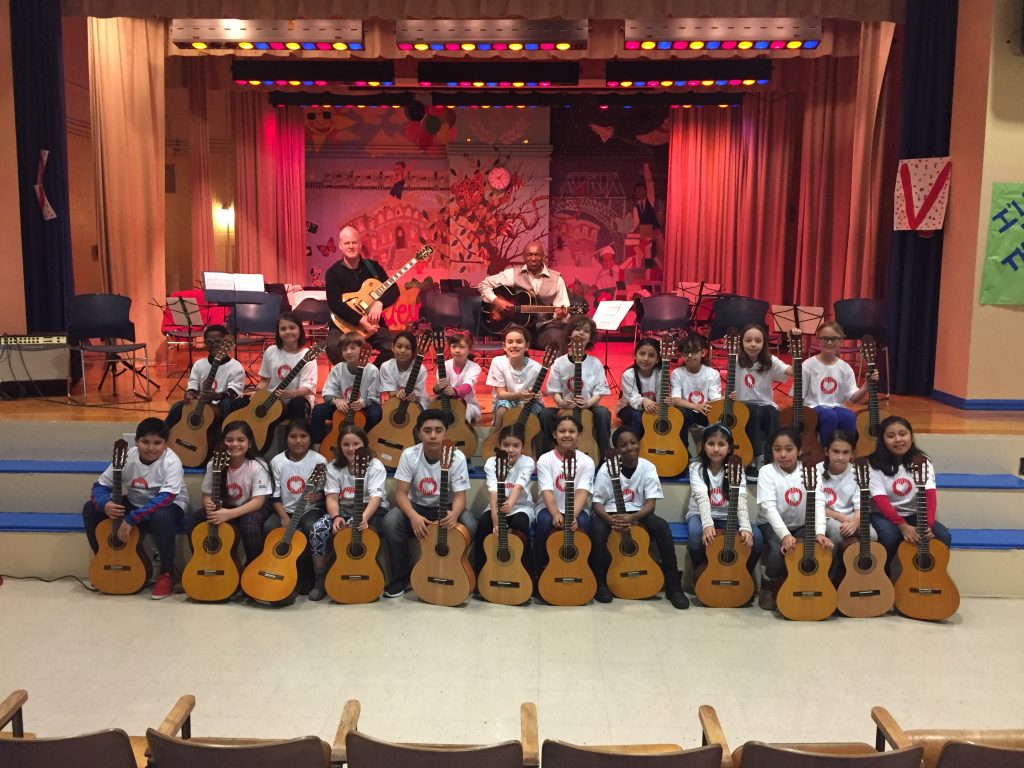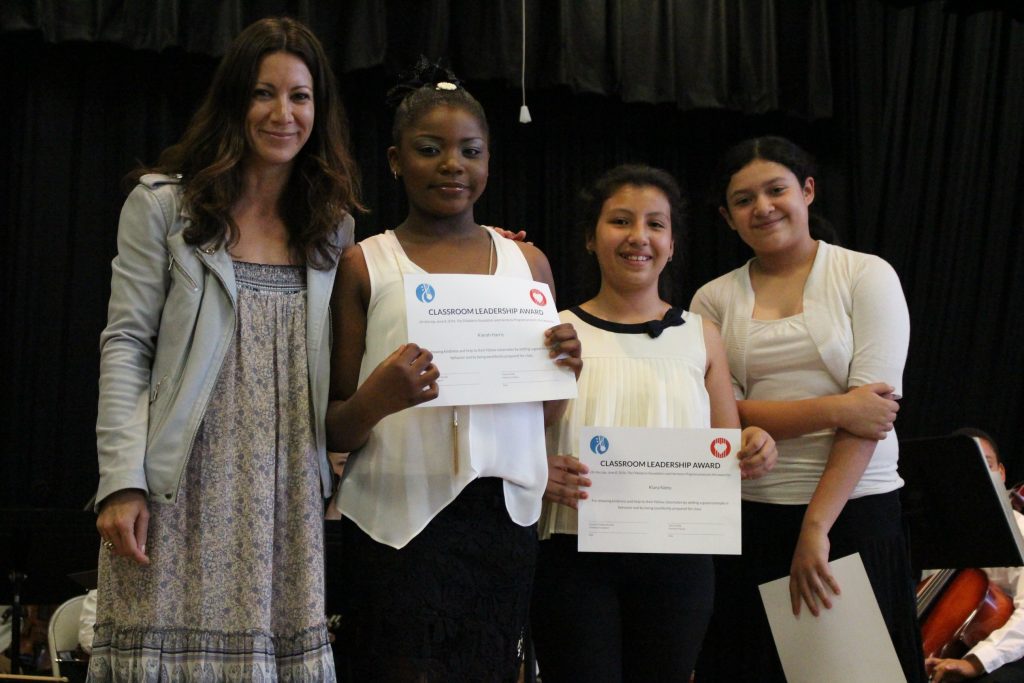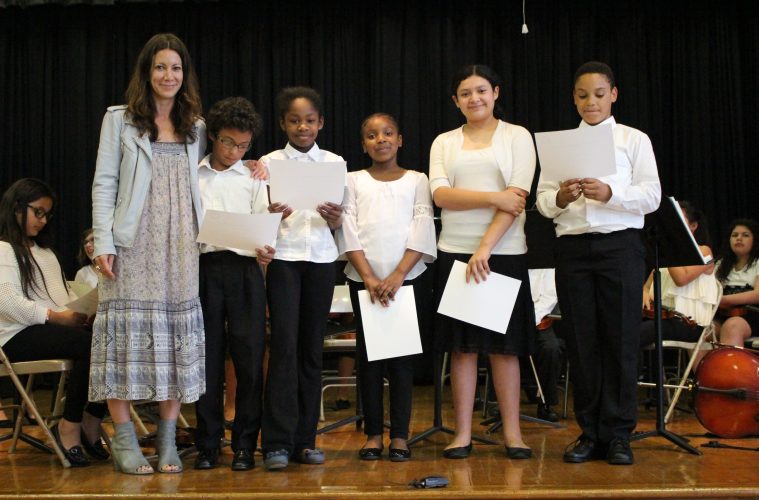
Suzanne D’Addario Brouder
Having been privileged to attend the NAMM Music Education Advocacy DC Fly-In three times in the past several years, I am acutely aware of not only the body of research that supports music-making’s profound, beneficial effects on children, but also the bones-deep passion so many music products industry members have when it comes to protecting and preserving music programs. Among our industry’s most passionate—and most effective—champions of music programs is Suzanne D’Addario Brouder, who is Executive Director of the D’Addario Foundation and who has attended the Fly-In in past years. Her exceptional work on behalf of the foundation has helped it secure the Music & Sound Award (MSA) for Outstanding Community Service an unprecedented four years in a row.
In this wide-ranging conversation, she shares her conviction that music programs can be genuinely life-changing experiences for society’s most vulnerable, at-risk youth.
The Music & Sound Retailer: We know that the D’Addario family has been involved in making music products going back generations. So, the music industry’s in your DNA. What’s your personal history with music? Do you play any instruments, or have you ever? Have you always been involved in the family business and the MI industry?
Suzanne D’Addario Brouder: Yes, our ancestry in the music business goes back to 17th century Renaissance Italy! More than 400 years and many generations later, our family proudly continues to be a global leader, with an ever-expanding team of musicians, engineers, artists and visionaries who are driven by innovation.
Personally, my experience with music goes very deep; I am emotionally driven by the power and beauty of music. My mother was a talented pianist. So, I studied piano for most of my childhood, in addition to taking violin in school. After college, I took up the classical guitar and, now, I play both piano and guitar. I actually just started taking piano lessons again. My husband and I are raising three boys, so I have begun to appreciate the meditative qualities of playing an instrument. It’s an escape for me, but my family also really enjoys to listen to me play. I can’t tell you how happy it makes me to hear an instrument being played in my home.
Although I am a D’Addario, I never thought I would be a part of the family business. I left New York at 17 to go to college, and I never returned to the East Coast. Settling in Chicago IL, I embarked on a career in fashion. I always had incredible respect and admiration for what my family had created, but I wanted to explore things independently; frankly, my father always encouraged us to do so. In fact, we have written into a family constitution that our children, before being considered for a job in the family business, must work for someone else for a period of time. However, I became inspired by the work of the D’Addario Foundation about 10 years ago, so I joined the Board at that time.
The Retailer: Tell us about the D’Addario Foundation’s creation. When was the Foundation started? What was its founding mission? Was it centered on funding and supporting music-education programs from its inception?
D’Addario Brouder: In the late ’70s, D’Addario had perfected professional-quality classical guitar strings, but it couldn’t get any artists to try them. My father, John D’Addario, and my uncle, Jim D’Addario, also saw that up-and-coming artists were struggling to break through and make a living. The D’Addario Foundation, in its first iteration, was born from a desire to connect with those artists and support the development of their careers.
A Performance Series was established in New York and a few other cities to present talented emerging artists, such as Ben Verdery, Paco Pena, and Michael Newman and Laura Oltman, at that time. After about 10 years of presenting the series, the D’Addario Foundation decided to shift its focus as it began to see music and arts programs being cut from regular school curricula. Ironically, at the same time, we found more and more evidence of the profound effect that active participation in music can have on education and well-being.
Today, we see ourselves as a unique grant-making organization that supports the most effective organizations on the frontline to improve access to music education, trying to bridge the gap that still exists in our education system. We are particularly interested in partnering with programs that provide frequent, comprehensive and sustainable music education that, ideally, is available throughout a child’s primary and secondary education. Initiatives with strong leadership and future-minded thinking, which plant themselves firmly and create a beautiful community around music instruction, are the kinds of programs we seek to support.

Midori & Friends provides music-education opportunities to New York City students who, otherwise, would have little access to the arts.
The Retailer: When did you begin your tenure as Executive Director of the D’Addario Foundation? Upon taking the reins of the organization, what steps did you take to make it an even better, more valuable resource to the music products industry and the community of music makers?
D’Addario Brouder: I took over as Executive Director of the D’Addario Foundation about seven years ago. At that time, although the enthusiasm and dedication to our mission was there, the organization itself was run unconventionally…primarily led by a few family members. It was very clear early on that we would benefit greatly from peeling back the layers of our organization a bit and restructuring.
First and most importantly, we did a deep evaluation of our mission and grant-making processes to identify opportunities for improvement that, ultimately, would allow us to make more effective and impactful investment choices. That included a complete overhaul of our grant-application process, our Web site, our method of evaluation, and our follow-up and measurement capabilities. Now, our strong suit as a grant-making organization is our ability to identify the most comprehensive and deeply impactful community-based programs in areas of great need, and to shepherd those organizations.
In addition, we have brought great clarity to our mission by cultivating a dynamic Board of Directors, along with advisors who are extremely passionate about this work and who, as strong advocates for music education, are committed to bringing greater visibility to the cause. You mentioned DNA earlier, and it’s vital to our DNA as a family to continually expand our efforts to support access to music education, to develop new music-makers and, in turn, to use music as a vehicle for meaningful and long-lasting social change.
The Retailer: Discuss the D’Addario Foundation’s latest efforts to support high-quality music-education programs. I recently heard that the Foundation awarded 107 music-education grants. Tell me about that, as well as other recent activities.
D’Addario Brouder: Our philosophy, based on many years’ experience, as well as carefully evaluating the net positive effect of our efforts, is to seed programs in the early stages of development, which is when support is most critical. Because there is not a one-size-fits-all solution, we believe in partnering with highly qualified leaders who understand the unique challenges in their communities. We also believe in supporting a diverse range of programs. That’s not to say that we wouldn’t entertain another approach. But, the bottom line is, we seek to support the most transformative and sustainable work in the area of music education.
We receive quite a large number of requests each year, and we choose to support as many, as deeply, as possible, within the constraints of our budget. We give not-for-profits an opportunity twice yearly to apply for support. In our most recent round of review, we awarded 107 grants, spread across 30 states; forty-five of those applicants are first-time grantees of the D’Addario Foundation, and they’re doing really inspiring work in their communities.
In addition to our primary grant making, we partner with the Harmony Program to run a wonderful, free music-instruction program on Long Island NY, close to the D’Addario & Co. headquarters. That program was created because we wanted to give back to the community of employees at D’Addario. A school district that a majority of our employees’ children attend was identified. That school district also had a very strong need, having been without a string program for more than 30 years. During the last three years, we have developed a robust program, providing stringed instrument instruction at least 30 weeks of the year, for up to eight hours per week. In addition, through our partnership with the Harmony Program, our students are able to participate in a large Saturday morning orchestra with students from other New York programs, as well as engage in a full-day workshop each year with members of the New York Philharmonic.
Lastly, we are able to award a full scholarship to one deserving student each year to attend the Usdan Camp for the Performing Arts all summer. We are really proud of this program, which has been managed very cost effectively in our partnership with the Harmony Program. And we’re actively seeking support to help sustain it. In addition to the vital experiences we are providing the children and the families involved, we are learning valuable lessons about running our very own direct-service program. It has allowed us to better understand the unique challenges that not-for-profits face.

Students from Long Island NY thrive when exposed to music-education programs, which the D’Addario Foundation tirelessly supports.
The Retailer: Last year, the D’Addario Foundation held a hugely successful “Music Makes You” benefit concert, which helped to raise $160,000 in support of music education. Tell us about how that came together. It must have been a tremendous undertaking.
D’Addario Brouder: For more than 30 years, D’Addario & Co. has donated a significant portion of its net income annually to the D’Addario Foundation, thus funding our mission. What that essentially means is that a percentage of every product we sell goes directly to supporting music education. In 2016, as a result of a few things—the many improvements we, as an organization, made over the last five years; the continuing need to support music education; and the amazing results we were seeing—we decided that it was time to greatly expand what we do.
Although D’Addario has been in the music industry forever, we really have never asked anything of anyone, nor are many people aware of the philanthropic work that we’re doing through the foundation. In 2016, our goal was to change that, and I think we achieved that goal. But the hard work is only beginning, as we answer to a larger pool of stakeholders and critically analyze our abilities, our processes and our impact potential in the future. We also have to remain flexible and move as needs change. And we have to constantly ask ourselves, “With the resources we have, what can we do to ensure we are the best champions for music education?”
In 2017, we continue to seek out those interested in allowing us to invest in a diverse range of exceptional community-based programs that change the life trajectory of the children they serve.
The Retailer: What can you tell us about future events that the D’Addario Foundation might be planning that are similar to the “Music Makes You” benefit concert? Is anything on the horizon?
D’Addario Brouder: We have a very exciting, bold plan for a benefit concert in New York, whose details we are just now ironing out. In addition to raising funds to expand the work that the D’Addario Foundation does, this approach, we hope, will generate a lot of attention, carrying the need to support music education to a much broader audience.
The Retailer: You are very passionate about ensuring children have access to high-quality music-education programs. Explain some of the benefits children enjoy by virtue of participating in robust music programs in school and after school.
D’Addario Brouder: Making it possible for kids to study music is an essential element of education, and we want to support programs that give a child that opportunity through all stages of his or her education. Learning to play an instrument teaches collaboration, discipline, focus, resilience and confidence. It has also been proven to enhance a child’s academics: not just in mathematics, but also in language and science. It unlocks the ability to think in creative and innovative ways. When extending those opportunities, what we receive in return are children who will be better citizens of the world.
As grant-makers, we provide support for programs that are not just teaching music, but also lifting human aspirations, elevating quality of life and strengthening disadvantaged communities. Since these programs began, we have seen amazing results. In neighborhoods where the high school dropout rate hovers at 50 percent, more than 95 percent of participating students are graduating on time and applying to college. Many are the first generation in their family to attend college. The rate of attendance for some of the daily music-training programs exceeds 90 percent. In many programs, participating students are involved for an average of seven years.
Active participation in music via community-based programs gives kids the ability to defy the odds, attend college and, ultimately, succeed in life.
The Retailer: The D’Addario Foundation has won the MSA for Outstanding Community Service for four years in a row. That’s unprecedented in MSA history. Tell us a bit about how the D’Addario Foundation might differ from other company-rooted charitable organizations.
D’Addario Brouder: Great question! First off, I would say that there are certainly a number of organizations and individuals in our industry that care very deeply about supporting the development of music education, and they do the best they can to make a contribution. Receiving this recognition is also an acknowledgment from our industry peers that they understand that, by purchasing D’Addario products, they, in turn, are supporting something incredibly meaningful, because a percentage of every product sold goes to support music education.
There are many ways that I think we are uniquely equipped to significantly impact access to music education. First, we have more than 30 years’ experience researching the methods required to make the right funding choices. One-hundred percent of our budget is dedicated to our partner programs, as D’Addario & Co. absorbs all our operating costs. Unlike many other philanthropic organizations, we seed programs in the early stages of development, and we support a very diverse range of programs. The credibility of our company name makes it possible for grantees to garner other forms of support.
Our affiliation with D’Addario also allows us to donate critical instrument accessories, as well as provide monetary grants. And, lastly, our experience running our very own lessons program provides critical insight into the daily challenges and successes of running programs that are very similar to those we support.
The Retailer: What’s the most motivating, inspiring aspect of your job? When your inbox is overflowing and there are a million things to do, what makes you eager to get out of bed in the morning and get to work?
D’Addario Brouder: It’s simple, really: Music itself is inspiring to me. The effect it has on me fuels my desire to ensure that as many children as possible have access to its beauty. But, every day, I am inspired, in particular, by the countless individuals who, despite significant odds, are doing extraordinary work to positively impact the lives of kids through music. They are people who, on a daily basis, give their free time, their own money, their food and their kindness to others in need. I am amazed every day by their passion, and I want to do as much as possible to help them achieve success.
Keep in mind that many of the programs we support are doing much more than just teaching a child to play an instrument. These programs, particularly those that take place during after-school hours, become a safe haven for kids. Students receive homework help, snacks and other forms of assistance. When a child is shepherded through that type of program, you suddenly see the development of a conscientious individual…someone who wants to give back and be a mentor to the next generation…someone who dreams bigger for himself or herself.
The Retailer: What do you foresee the D’Addario Foundation doing five years from now?
D’Addario Brouder: Currently, much of our support is directed to independent not-for-profits that bring music instruction into schools where it does not exist during after-school hours. Five years from now, I hope that our work will have made inroads, influencing school districts across the U.S. and beyond to institute music programs during the school day, or to build more time during the week for more robust music instruction. In five years, we will also have even more powerful statistics that provide further proof that students—particularly those from disadvantaged communities, who are at risk—have much-improved outcomes in terms of graduation rates and college enrollment when they participate regularly in music instruction.
Additionally, the D’Addario Foundation has only scratched the surface in terms of collaborating, and making connections, with others in the music industry (and beyond) to instill a desire to make music in future generations. In five years, I imagine having stronger partnerships with dealers and a systematic way to work together to encourage that development.
Similar to the DNA of D’Addario & Co., we will continually seek innovative solutions to encourage the widespread development of music education, and to help ensure that as many children as possible have access to profoundly impactful music-making opportunities.


